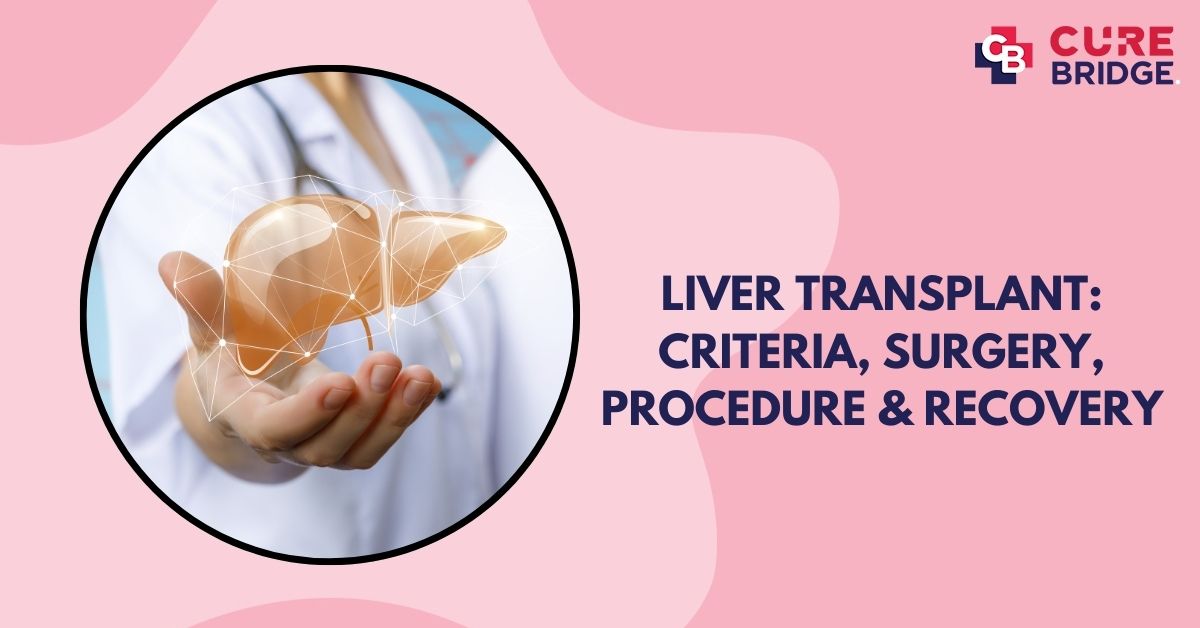
Liver Transplant: Criteria, Surgery, Procedure & Recovery
Liver transplants are complex procedures, but understanding the fundamental aspects can help you grasp the significance and implications of this life-saving treatment. From the criteria for eligibility to the recovery process, here’s a comprehensive guide on what to expect.
Liver Transplant Criteria
A liver transplant is an intricate surgery performed when a liver becomes severely damaged and no longer functions properly. The criteria for undergoing a liver transplant involve several key factors:
- Severity of Liver Disease: The Model for End-Stage Liver Disease (MELD) score helps assess the urgency for a transplant. This score considers factors like bilirubin levels, creatinine levels, and INR (International Normalized Ratio). Higher MELD scores generally indicate a more urgent need.
- Overall, Health: Candidates must be in good general health to endure the surgery and recovery process. This includes having no other severe medical conditions that could complicate the procedure or post-operative recovery.
- Alcohol and Drug Use: Patients with a history of substance abuse may need to show a period of sobriety before they can be considered for a transplant. This is to ensure that the new liver will not be subjected to similar risks.

The Procedure: What to Expect
A liver transplant involves several critical steps:
- Pre-Operative Preparation: Before the surgery, patients undergo extensive testing to ensure they are fit for the procedure. This includes imaging tests, blood work, and assessments by various specialists.
- Surgical Process: During the liver transplant surgery, the diseased liver is removed, and a healthy liver from a donor is implanted. The operation typically lasts several hours and requires the patient to be under general anaesthesia.
- Post-Surgery Care: After the surgery, patients are monitored in the intensive care unit (ICU) for a few days. Recovery involves managing medications to prevent rejection of the new liver and monitoring for any potential complications.
Liver Transplant Success Rate and Cost
Understanding the liver transplant success rate and cost is crucial for patients and families.
- Success Rate: The liver transplant success rate has improved significantly over the years. Most patients experience positive outcomes, with high survival rates in the first year after surgery. Long-term survival rates are also favourable. The five-year survival rate for liver transplant patients in India is around 70-75%. This can vary depending on factors such as the patient’s overall health, the presence of any complications, and adherence to post-transplant care.
- Cost: The liver transplant cost can be substantial. It includes pre-transplant evaluations, the surgery itself, hospital stays, and long-term medications. Many insurance plans cover liver transplants, but patients should be prepared for potential out-of-pocket expenses. It is wise to discuss the financial aspects with healthcare providers and insurance companies to understand the coverage and additional costs.

Recovery and Long-Term Care
Recovery from a liver transplant involves several stages:
- Immediate Recovery: After surgery, patients spend time in the ICU; where their condition is closely monitored. The initial recovery phase focuses on stabilizing the patient and managing pain.
- Hospital Stay: The hospital stay can last from one to several weeks, depending on the patient’s condition and progress. During this time, healthcare providers will monitor liver function and adjust medications as needed.
- Home Recovery: Once discharged, patients need to follow a strict regimen of medications and regular follow-up visits. Immunosuppressants are crucial to prevent organ rejection and must be taken for life.
- Lifestyle Adjustments: Patients may need to make lifestyle changes to support liver health, including a balanced diet, avoiding alcohol, and maintaining a healthy weight. Regular exercise and routine medical check-ups are also important.
Living Donor vs. Deceased Donor
Liver transplants can come from two types of donors:
- Living Donor: In a living donor transplant, a portion of the liver is taken from a living person, often a close relative. The liver regenerates in both the donor and the recipient, making this a viable option for many patients.
- Deceased Donor: In a deceased donor transplant, the entire liver is obtained from a donor who has passed away. This type of donation is more common and relies on the availability of suitable organs.
Final Thoughts
A liver transplant can offer a new lease on life for those with severe liver disease, but understanding the criteria, procedure, success rate, and costs is vital. If you or a loved one are considering this surgery, it’s essential to have all the information needed to make informed decisions. For personalized guidance and assistance with liver transplants, including finding top hospitals and understanding costs, visit Curebridge that specialises in medical tourism. Their expertise can help streamline the process and ensure you receive the best care possible.
By familiarizing yourself with these aspects, you’re better prepared to navigate the complexities of liver transplantation and support yourself or a loved one through this crucial medical journey.
